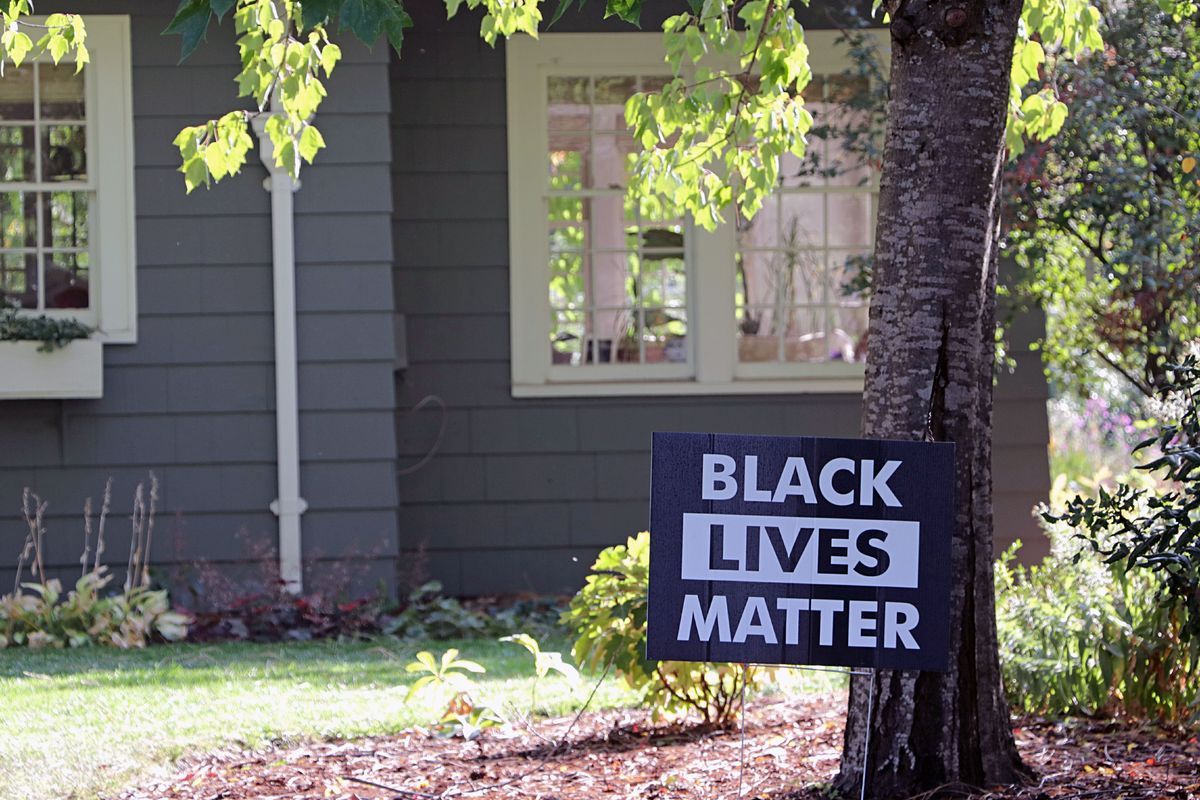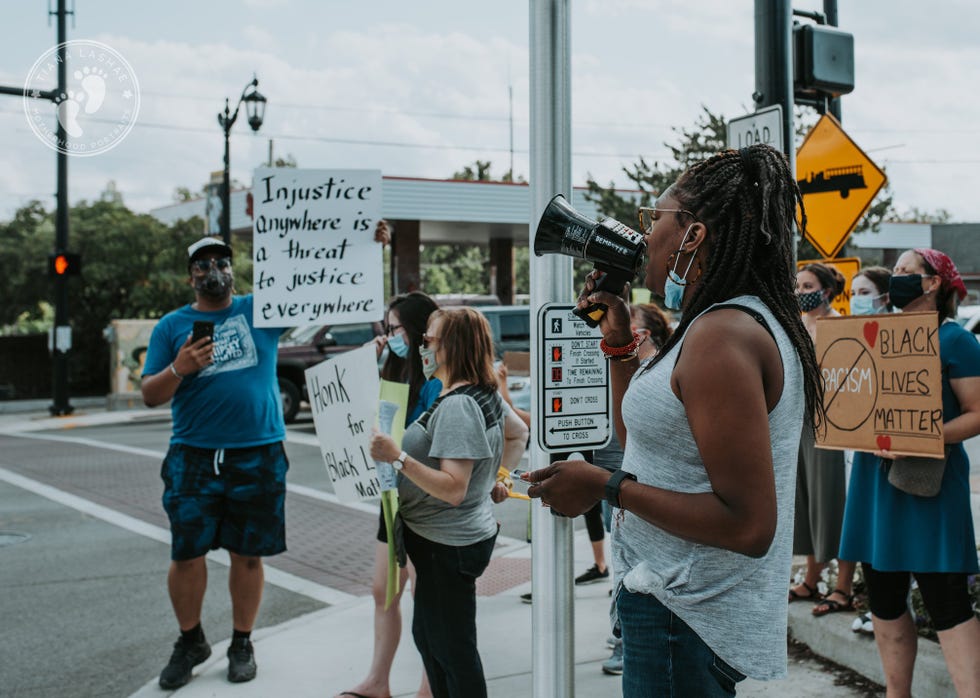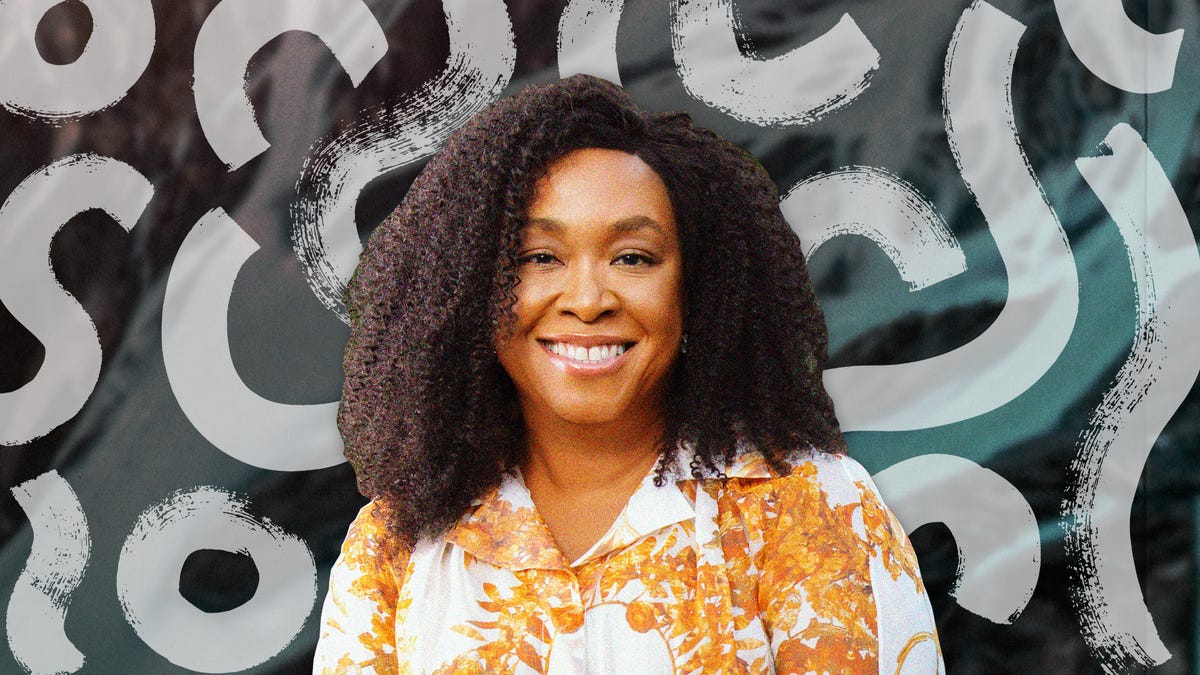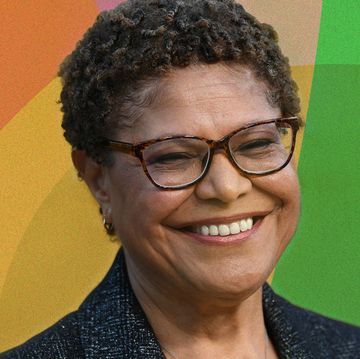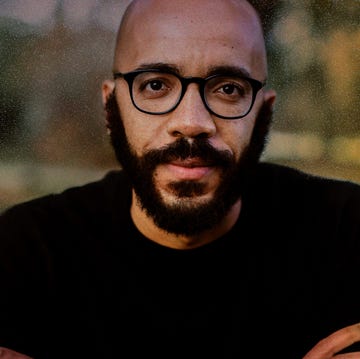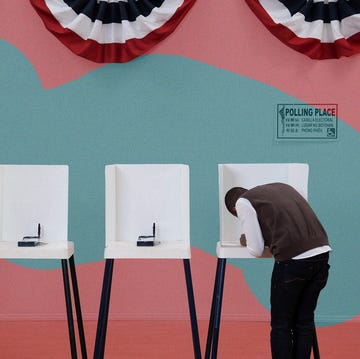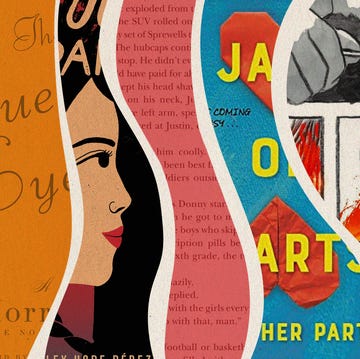Despite George Floyd’s murder igniting a social justice movement around the country last summer, he was certainly not the first Black person to die at the hands of police — and he certainly was not the first Black or brown body to fall victim to years of oppression and violence. Yet when a global pandemic helped to spur on a movement for racial equality, amid a virus forcing the world to slow down while simultaneously uniting us in trauma, such a blatant injustice was incomprehensible. Especially to many who, prior to Floyd’s murder, had been — out of fear, ignorance, or privilege — reluctant to lend their voices, support, and action to calls for justice that was, and still is, sorely needed.
In the rise of new marchers, protestors, and allies was a contingent of suburban white moms who took the tragedy as a personal call to action. An often-underestimated group — suburban white women, specifically stay-at-home moms — refused to sit idly by during the historical moments of 2020, for “all mothers were summoned when George Floyd called out for his mama.” They organized protests in support of the Black Lives Matter movement, frequently with kids in tow due to lack of childcare during a pandemic. In response to Donald Trump’s tweet that the “suburban housewife” would vote for him (they didn’t), suburban moms rallied in support of President Joe Biden. Moms strategically utilized what free time they had to show their support for social justice and to volunteer for political progress.
But now that the dust has settled and President Biden is in the Oval Office, some progressive moms are left with a new reality: their activism has alienated them from family and friends.
Heather Nye, a 38-year-old white stay-at-home mom from Ohio (a state that voted for Trump in 2020), confirms that her anti-racist journey began with the killing of George Floyd. She says, “It was eye-opening for me. I started listening to these mothers of Black children talking about the fears they had, and those weren't fears I had for my kids. Being a parent really gave me a new perspective. It was just like, how can I ignore this? How can I let people go through this with their children and just say, ‘Well, it doesn't affect my children?’”
Nye, along with several other moms from the Toledo area, were fueled into action. They attempted to organize a kid-friendly protest for Black Lives Matter during the summer of 2020, using the social media platform available to them: an Ohio-based Facebook group, called “Sylvania ‘Bad Moms.’”
But the call to action to organize a protest placed within the Facebook group was immediately taken down by a group admin. The reasoning? Political events were not permitted as someone posted in the Facebook group. “The whole point of the group was to be light-hearted and make playdates,” one user wrote.
One white mom, Samantha, posted the following: “If standing together peacefully to bring awareness to prejudice is against this group’s rule, you should add it to the description so your members know who they’re dealing with. I hope everyone here stays safe and healthy, but I can’t stand for censorship and silence.”
Her post led to a flurry of both angry and supportive comments. Several moms argued that protesting for equality was not a political issue, but rather a moral one. One mom wrote she would now second guess bringing her biracial children to playdates organized through the group. A white mom responded with seemingly open racism, writing, “I don’t think any of us want to open our houses for them anymore, so I don’t think you’ll have to make that decision.”
Tiana Lashae, one of the few Black moms in the group, recalls, “I was like, ‘Oh, my God. Did you just say that? You don't want people of color in your house anymore? Like, did you just say that?’” Lashae remembers, “One lady basically said, ‘If you don’t like it, start your own group if that's what you want to talk about.’ And so that's what we did.”
From that incident, Toledo Moms for Social Justice (TMSJ), a private Facebook group that has since morphed into more, was born. The group shares resources; comments on political issues and biased businesses; supports anti-racist, women-owned and Black-owned businesses; raises money for various causes; collaborates with MelaNation Healing Project on a podcast about honest conversations about race; and plans to expand to do more in the future.
Ra’Shya Ghee, a Black anti-racism educator, professor at the University of Toledo, and attorney, asserts virtual anti-racist white communities like TMSJ are exactly the kind of “grassroots perspective” needed in order to “cultivate change and create authentic dialogue.”
Ghee expounds, “The power of whiteness lies in its invisibility. Race is not frequently discussed or named in white spaces. The process of naming racism, of drawing it out in a community space is helpful in consciousness-raising. Anti-racism also creates a sense of community outside of oppression and otherness. One of the most effective ways to dismantle racism is to build relationships with other white people and hold them accountable.”
Nye, who had been a member of the “Bad Moms” group — and also volunteers with Planned Parenthood Advocates of Ohio, was a poll worker during the 2020 election, and spent countless hours supporting Biden’s election campaign with phone calls, texts and handwritten postcards — became one of the new admins for TMSJ.
“We wanted to have conversations about race and social justice, and the admin of the other group was basically just shutting them down," she says. “And so TMSJ became this safe space where we could be open, where we could learn, where we could come and be corrected, and also where we could amplify Black voices if they wanted to speak.”
Ghee asserts that these safe spaces are essential to certain sectors of white America learning exactly how traumatic and ongoing racism is in this country. She explains, “It’s helpful for white people to have their own space to process their own emotions and not be something else people of color have on their shoulders.”
Yet Ghee emphasizes that these predominantly white spaces still need voices of color: “If the goal of a group is to be anti-racist, there must be some influence from people of color. Whiteness isn’t something white people interrogate in white spaces, and without the influence of people of color, the concern becomes that it will be a self-fulfilling echo chamber.”
Toledo Moms for Social Justice is navigating these rocky waters — oftentimes succeeding and sometimes failing — but nonetheless providing a forum for women (and a few men) to discuss social justice and systemic racism.
Lindsey Dash*, a 30-year-old white single mom with a three-year-old Black daughter, discloses that her anti-racism journey began after becoming a parent, and she has lost both family and friends over her refusal to “ignore or be quiet about issues of social justice and human rights.”
Dash shares, “The majority of my friends are silent; they prefer not to say anything about [racism] and they don't like it being discussed on social media.”
“As far as my family,” she continues, “the times I've tried to broach the topic with them, it usually ends in an argument about how they don't have any privilege and they're tired of being told because they're white, they have so much privilege. My father has told me when it comes time to go to college, my child will have all of the paths in the world opened up to her that he never had because he was a white man.”
Dash concludes, “I was raised to believe in ‘tolerance, not acceptance,’ and now being a mom of a Black child, I’ve learned acceptance and inclusivity are the goal. I now consider other perspectives other than my own white female one, and I’m aware of the spaces I’m in and seek to be an ally.”
Ghee acknowledges a newfound frequency in the issue of race coming up and leading to “a breakdown of familial relationships to such a degree that a progressive person feels the need to remove themselves completely from their familial situation.” However, this is a small price to pay for anti-racism work.
It is only now, thanks to the BLM movement reignited by the murder of George Floyd, that some are willing to take a step back and analyze the myriad of ways in which white folks have benefitted from a system that oppresses Black bodies.
As a co-founder of TMSJ, in my own anti-racist journey, I’ve witnessed and addressed microaggressions and lowkey racism amongst white parents, which subsequently led to my 8-year-old son receiving fewer playdate invitations. But my experiences pale in comparison to the very real and dangerous hate, discrimination, and prejudice that Black and brown people face every day. Furthermore, I have the option to remain silent and fall back into the privilege of whiteness. But now that I know better, I plan to do better. I plan to do more. And I plan to never use my whiteness as a safety net.
For every personal loss along my anti-racism journey, I’ve experienced double the gains. While we may have fewer friends these days, the authentic and honest relationships we have with the families in our lives make previous friendships seem superficial. I’m now part of a virtual community of like-minded individuals I can disagree with, learn from, and grow with, and this group has helped me think critically about racism and social equity.
I’ve become a better person and parent, and I’m confident my kids won’t make many of the mistakes I’ve made over my lifetime. It’s challenging work, but it is more than worthwhile.
*Name changed to protect identity.
Erin Marsh is a writer and yoga teacher from the Midwest who enjoys looking at the world upside down and using semicolons whenever possible. Follow her on Twitter @theyogiwriter.
Get Shondaland directly in your inbox: SUBSCRIBE TODAY
